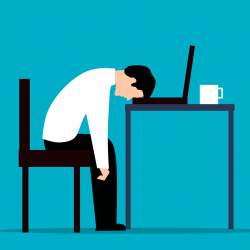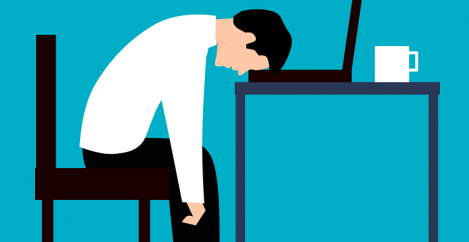November 18, 2021
Companies risk mass exodus as more than half of young professionals feel ‘burnt out’
 More than half of young professionals (those aged 16-34), feel burnt out right now, according to new research exploring experiences of burnout pre and post pandemic from people analytics company, Visier.
More than half of young professionals (those aged 16-34), feel burnt out right now, according to new research exploring experiences of burnout pre and post pandemic from people analytics company, Visier.
The study asked 2,000 Brits whether they were currently experiencing feelings of burnout -defined using the World Health Organisation’s (WHO) definition of ‘feelings of energy depletion or exhaustion, increased mental distance from one’s job and reduced professional productivity in relation to chronic workplace stress.’
The findings – which follows the 18-month period of COVID-19 disruption to the workplace – indicate that nearly three quarters (73 percent) of all respondents feel more burnt out since the onset of the pandemic, with 16–24-year-olds (80 percent) suffering in greater numbers.
Gen Z however, is not alone. During the past 18 months, as a direct result of work, all respondents flagged experiencing trouble sleeping (47 percent), exhaustion (46 percent) and negative thoughts (39 percent). Plus, nearly half of respondents (48 percent) admitted to getting agitated at partners, family members and friends. When asked what was contributing to these feelings of burnout, respondents cited shortage of employees (38 percent), long work hours (30 percent) and lack of reward and recognition (25 percent) as major contributing factors.
Tackling retention
Britain’s burnout problem is a challenge for retaining employees. According to the same survey, more than half (79 percent) of respondents have considered leaving their current job due to feelings of burnout. And, more than a third (38 percent) are actively job searching right now.
When it comes to burnt-out young professionals, the good news however, is that at least half of young professionals feel comfortable talking to their boss or manager about feelings of mental or physical exhaustion.
Flexibility is key
When asked what, if anything, could reduce levels of burnout at work, more reward and recognition for the work that I do (41 percent), more flexibility in my working day (38 percent) and a better resourced team (37 percent) were all cited as key factors by those currently feeling burnt out at work.
Of all employees surveyed, more than a third (36 percent) of respondents said they would like to see employers implement more flexible working hours and more wellness programmes (32 percent) to reduce burnout in the workplace.
[perfectpullquote align=”right” bordertop=”false” cite=”” link=”” color=”” class=”” size=””]”Britain is currently undergoing an occupational health crisis”[/perfectpullquote]
Andrea Derler, Principal for Research and Customer Value of Visier said: “Britain is currently undergoing an occupational health crisis. Burnout is becoming pervasive in our workplaces and employers need to act now to protect the wellbeing of their people or face the reality of a talent exodus. In particular, companies risk losing up and coming junior talent as burnout is becoming a generational issue – felt strongest by the Gen-Z and Millennial workforce.
“Though time off work is an important way to recharge, it isn’t enough to alleviate chronic burnout. Leaders must understand how their people are feeling and engage employees in conversations about burnout using workplace tools to gauge their stress levels. Managers can then work with direct reports to alleviate work-related fatigue and provide crucial support. Only by identifying these feelings earlier on is it possible to act in time before the burnout crisis leads to voluntary turnover”.














